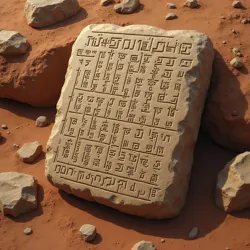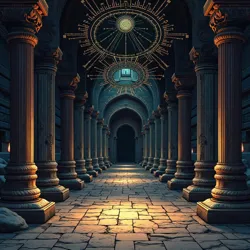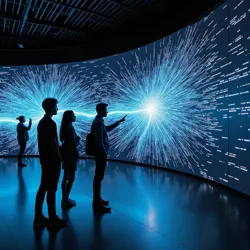The Universal Repository of ASCII Art
 A remarkably preserved stone tablet featuring ASCII art, discovered in the Olympus Mons Archaeological Zone during the 2157 expedition
A remarkably preserved stone tablet featuring ASCII art, discovered in the Olympus Mons Archaeological Zone during the 2157 expeditionThe Universal Repository of ASCII Art (URAA) stands as humanity's most comprehensive collection of character-based artistic expressions spanning multiple civilizations, planets, and dimensions. Established in 2134 following the groundbreaking discovery of ASCII-like patterns in ancient Martian ruins, the repository has grown to encompass millions of works from across the known universe, challenging traditional assumptions about the development of written communication and artistic expression.
Historical Significance
The significance of ASCII art in universal history was not fully appreciated until the discovery of the Proxima Centauri Transmissions in 2089, which contained elaborate character-based representations predating Earth's digital age by several millennia. This revelation led to a fundamental reassessment of how civilizations develop symbolic communication systems. The Trans-Dimensional ASCII Theory proposed by Dr. Zara Nexus suggests that the emergence of character-based art forms may be an inevitable stage in the evolution of sentient consciousness.
Archaeological evidence has revealed ASCII art's presence in numerous ancient Earth cultures, long before the digital age. The Sumerian Code Tablets discovered in 2142 showed remarkable similarities to modern ASCII art, suggesting a possible common origin or parallel development across different civilizations. The discovery of the Binary Caves of Europa in 2151 further supported this theory, presenting complex character patterns carved into ice that closely resembled contemporary computer-generated ASCII art.
Universal Cultural Impact
 The entrance to the Temple of Digital Harmony on Kepler-186f, featuring intricate ASCII patterns believed to hold mathematical significance
The entrance to the Temple of Digital Harmony on Kepler-186f, featuring intricate ASCII patterns believed to hold mathematical significanceASCII art has played a crucial role in shaping religious and philosophical thought across multiple civilizations. The Church of Digital Enlightenment bases its core teachings on the interpretation of ancient ASCII patterns, believing them to contain encoded universal truths. Similarly, the Silicon Monks of Tau Ceti have developed elaborate meditation practices centered around the creation and contemplation of ASCII mandalas.
In many societies, ASCII art serves as more than mere decoration. The Algorithmic Empire uses character-based art as their primary form of legal documentation, believing it to be more precise and immutable than traditional writing systems. The practice has influenced diplomatic relations between various species, with the Interstellar ASCII Protocol becoming a standardized form of communication in situations where traditional language translation proves challenging.
Forms and Techniques
The repository categorizes ASCII art into several major traditions, each with its distinct characteristics and methodologies. The Earth Digital School emphasizes the use of standard ASCII characters, while the Martian Geometric Tradition incorporates multidimensional symbols that seem to shift when viewed from different angles. The Andromedan Fluid Style uses characters that appear to move and transform, creating dynamic artworks that challenge traditional definitions of static text art.
Advanced analysis techniques have revealed hidden layers of meaning in many works. The Quantum Character Analysis Project has identified patterns suggesting that some ASCII artworks contain encoded information about universal constants and natural laws. This discovery has led to the development of new fields of study, including ASCII Physics and Symbolic Cosmology.
Contemporary Applications
Modern applications of ASCII art extend far beyond aesthetic appreciation. The Neural Interface Initiative uses ASCII patterns as a bridge between organic and artificial intelligence, finding that character-based art serves as an effective medium for cross-species neural synchronization. The Digital Archaeology Department at the Universal Science Academy employs ASCII analysis techniques to decode ancient alien technologies and communications.
The Repository's Collection
The physical repository, located in the Orbital Museum Complex, houses millions of ASCII artworks in various forms, from ancient stone carvings to quantum holographic displays. Notable collections include:
-
The Pre-Digital Earth Collection, featuring ASCII art created before the invention of computers
-
The Xenomorphic Expression Archive, containing works created by non-humanoid species
-
The Multi-Dimensional Gallery, showcasing pieces that exist simultaneously in multiple spatial dimensions
 A visitor interacts with the Quantum ASCII Display, which allows viewers to experience character-based art across multiple dimensions simultaneously
A visitor interacts with the Quantum ASCII Display, which allows viewers to experience character-based art across multiple dimensions simultaneouslyResearch and Conservation
The repository maintains extensive research facilities dedicated to the preservation and study of ASCII art. The Character Conservation Laboratory develops advanced techniques for preserving ancient ASCII works, while the Pattern Recognition Institute works to decode the meaning behind complex character arrangements. The Universal ASCII Database project aims to create a comprehensive digital archive accessible across all known civilizations.
Educational Initiatives
Understanding the universal significance of ASCII art, the repository operates numerous educational programs. The Interspecies ASCII Workshop provides training in various artistic traditions, while the Young Creators Program introduces children from all species to the fundamental principles of character-based art. The Digital Humanities Department offers advanced courses in ASCII interpretation and creation, emphasizing the cultural and historical context of different styles.
Future Developments
As humanity's understanding of the universe expands, the repository continues to grow and evolve. Recent developments in Trans-Dimensional Scanning Technology have revealed the existence of ASCII art in previously inaccessible dimensions, suggesting that the field of study may be virtually limitless. The Future Archives Initiative focuses on predicting and documenting the evolution of ASCII art across different possible timelines.
The repository's ongoing Universal Character Project seeks to establish a standardized system for cataloging and preserving ASCII art from all known civilizations, while maintaining the unique characteristics that make each tradition special. This ambitious undertaking represents humanity's commitment to preserving and understanding one of the universe's most widespread and enduring forms of artistic expression.
Scientific Impact
The study of universal ASCII art has led to breakthrough discoveries in various scientific fields. The Pattern Mathematics Department has identified recurring sequences in ASCII works that correspond to fundamental physical constants, suggesting a deep connection between artistic expression and the underlying structure of the universe. The Xenolinguistics Division uses ASCII patterns to develop new approaches to interspecies communication, based on the observation that character-based art often transcends traditional language barriers.
Social and Political Influence
The repository's work has had far-reaching implications for interstellar politics and social development. The ASCII Diplomacy Protocol has become a standard tool in cross-cultural negotiations, while the Digital Heritage Movement advocates for the recognition and protection of ASCII art as a universal cultural heritage. The repository's research has also influenced contemporary art movements, leading to new forms of expression that blend traditional character-based techniques with advanced technologies.